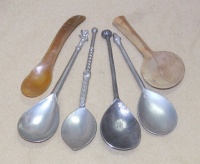Spoon: Difference between revisions
From Cunnan
Jump to navigationJump to search
m (categorising) |
m (Reverted edits by 209.200.38.173 (Talk); changed back to last version by KarenLarsdatter) |
||
| (5 intermediate revisions by 4 users not shown) | |||
| Line 1: | Line 1: | ||
Spoons, in period, were often made of [[metal]], [[wood]], [[bone]] or [[horn]]. The most commonly found examples are metal, presumably because it doesn't decompose as readily as the other materials mentioned. |
[[image:spoons.jpg|right|200px|thumb|Replica medieval spoons of pewter, horn and wood.]]'''Spoons''', in [[period]], were often made of [[metal]], [[wood]], [[bone]] or [[horn]]. The most commonly found examples are metal, presumably because it doesn't decompose as readily as the other materials mentioned. |
||
[[Viking]] spoons had quite shallow bowls. |
|||
== External Links == |
|||
* [http://www.larsdatter.com/spoons.htm Spoons from Antiquity, the Middle Ages, and Renaissance] |
|||
[[category:tableware]] |
[[category:tableware]] |
||
